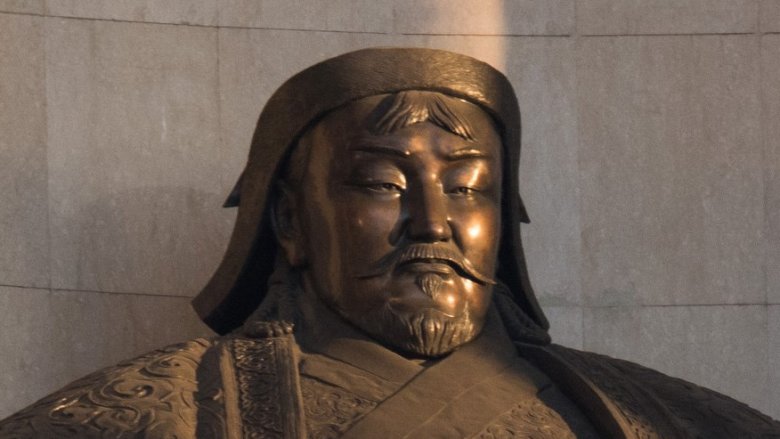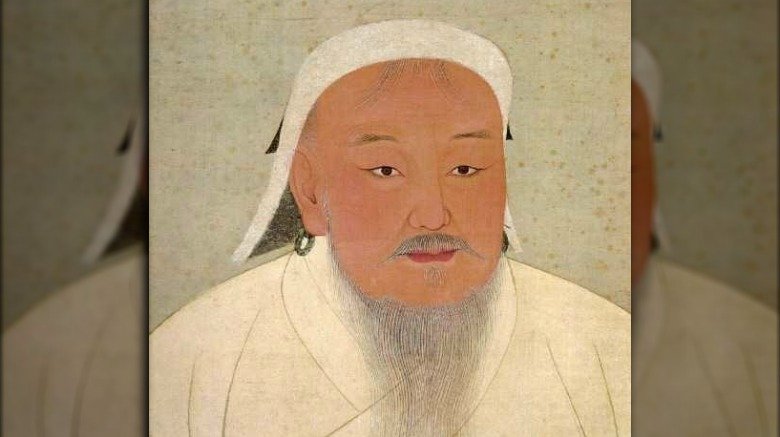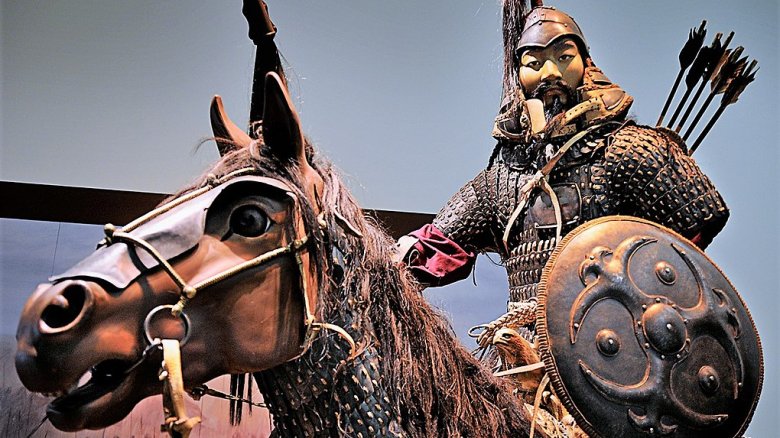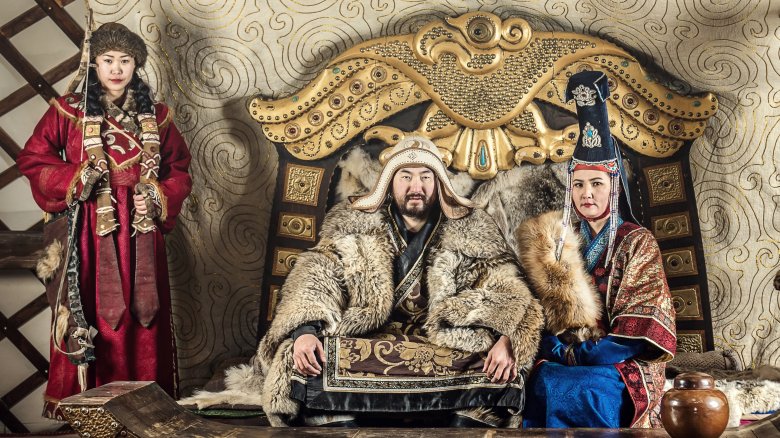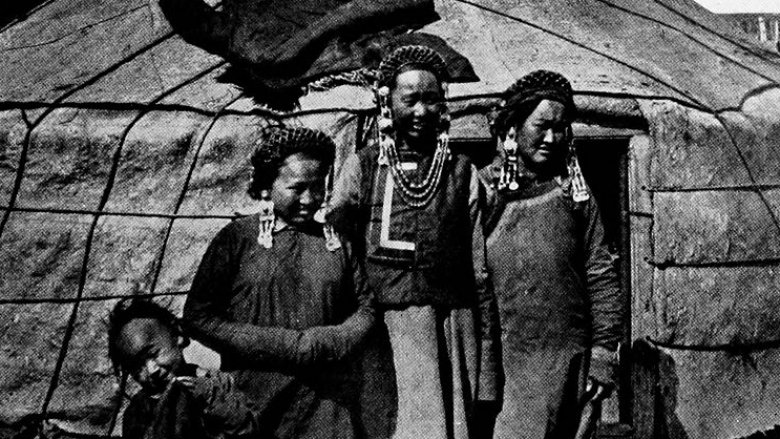What Life Was Like For Women Under Genghis Khan
If you've ever actually stopped to think about it, you probably assumed that life was pretty terrible for women under Genghis Khan. And you'd be forgiven for making that assumption. Most cultures that existed in the distant past have a not-exactly great reputation for treating women with respect and fairness, so why would you think that a dictator as brutal as Genghis Khan would be any different?
Most of what you're about to read will probably be kind of surprising (some of it not so much, but more surprising than not). The truth is kind of a mixed bag. Some women fared very well under Genghis Khan while others suffered terribly. But for the most part, the Mongols had some pretty progressive ideas about women's rights, at least compared to many of the other cultures that existed at the time — Western culture included.
Don't wish for a time machine yet, though. For the most part, women still ranked below their husbands and fathers so it's not like they were out there becoming CEOs of their own worldwide yurt enterprises or anything. They still had to fit into neatly outlined roles and meet certain expectations, it's just that they enjoyed a lot of freedom compared to women in other nations around the world. So here is the truth about it was really like to be female under the reign of the infamous Mongolian conqueror. More or less.
Your husband had to listen to you. No, really.
Women were actually respected in Mongol society (shocking, right?) and men were expected to listen to the advice of their wives. Wait, what? In Western culture, men have really only been listening to their wives for the past 50 or 60 years (well, some of them have been, anyway), so how did the Mongols, brutal conquerors of half of Asia, manage to have such liberated ideas?
Well, Mongols were brutal fighters, to be sure, but they weren't barbarians — at least not in every aspect of their lives. Mongolian women were respected, often served as leaders, and were highly valued members of society. In fact according to Amonbe, the Mongols believed that a man ought to marry an older woman, because an older woman would have more wisdom than her husband, and would therefore be able to guide him in not making stupid life decisions. In fact, no one respected a dude who didn't listen to his wife — it was a sign of immaturity and unmanliness. So just in case you thought that fierce Mongol warrior must also be a brute to the women in his life, well, you're mistaken. Mind, blown.
Genghis Khan's courts could tell your husband to be more romantic
When you imagine those early historical relationships between men and women, you probably think about some unsavory things. After all, we all harbor images of cavemen dragging cavewomen around by the hair — as it once was, it probably was through a lot of history. Except of course we don't really have any idea how cavemen treated women, and those images were all mostly drawn by misogynistic cartoonists in the 1950s, but whatever. Throughout history, an awful lot of women got abused by an awful lot of men, so it's probably a safe bet that whatever historical culture you're looking at, the men ruled pretty much everything, both out of the bedroom and in it, too.
According to Amonbe, though, it wasn't exactly like that in Mongolian society. Mongol women had a lot of control in the home and in the bedroom, too. In fact, if you were a Mongol woman and your husband wasn't up to performing his husbandly bedroom duties — and we don't mean dusting and making the bed — you could actually petition the government to intervene. Imagine going down to the local courthouse and presenting documented evidence of your husband's romantic failings, and asking the court for a Viagra prescription. If that's not enough to convince your husband to be attentive, probably nothing is.
No foot binding over here, thanks
Meanwhile in China, south of the Mongol empire, Neo-Confucianism outlined strict rules for female behavior — women were supposed to be chaste and obedient, and wives should basically exist only to serve their husbands, except when their husbands die, and then they should exist only to serve their husbands' families because they weren't supposed to remarry. Also, women in the upper classes had their feet bound starting at age six, because a three-inch foot made them a hot item, a four-inch foot made them a good consolation prize, and a five-inch foot ... well, women with five-inch feet might as well start on that collection of cats now because spinsterhood is calling.
In Mongolia, women were not having any of that. According to Amonbe, Mongolian women were tough — they raced horses, they fought in battle, and there was always a women-only round in the archery competitions. So Mongolian women were basically just super-extra awesome and badass and they did not especially want to have tiny feet. Mongolian women were not thought of as subservient trophy wives, either — they were expected to be strong, fierce, and hard-working. And when cultures place those kinds of expectations on women, that tends to inform the family dynamic. Women who are strong and fierce can't also be complacent and subservient.
Under Genghis Khan, women were the cartmasters
Imagine if you were the person in charge of driving and maintaining the family car and also, you could make all your male family members walk. Well, the Mongols mostly rode horses, but you get the idea. In Mongolia during the time of Genghis Khan, the women were in charge of the carts and the men were strictly not allowed to ride in them, unless they were sick. That probably had more to do with the fact that Mongol men were supposed to be excellent horsemen (so they could be excellent warriors and pillagers) and riding in a cart took precious hours away from equestrian practice, but anyway. The carts were the domain of the women, and no men allowed.
Mongolian carts weren't just a way to go back and forth to the grocery store, either, they were one of the most important components of the nomadic lifestyle. According to the San Diego Tribune, the carts carried the felt tents that the Mongols lived in, and most of their goods and supplies, too. So if the cart drivers decided to go on strike, well, the whole community was in trouble. Just another great example of "happy wife, happy life."
Women were expected to do physically demanding tasks
In a nomadic society, you can't afford to have slackers. There's just too much work to be done. So that means it there's no room for anyone who can't make him or herself useful, women and children included. According to the University of Victoria, Mongolian women were not only expected to shoulder a lot of the responsibility, they were also expected to do a lot of the heavy lifting. It was the womens' job to take down and put up the tents, and they had to do it quickly and efficiently. They were also expected to be able to control the tribes' often vast herds of animals, and do all that stereotypical women stuff, too, like raising the kids and cooking a meal every night.
So women, as well as men, had the responsibility of doing the sort of work that today we'd probably call heavy manual labor. It's really not surprising, then, that Mongolian men had so much respect for women — it's hard to disrespect someone who's as hard-working and capable as you are, especially if you're seeing it with your own eyes every single day.
Women often faced hardship and handled it with grace and fortitude, too. Genghis Khan's own mother was forced to raise her children on game and wild roots because they'd been abandoned by her tribe after the death of her husband. That upbringing probably had a lot to do with Genghis' progressive ideas about women.
If Genghis Khan says "marry my daughter," you should totally do it
Genghis Khan had four poorly behaved sons, but most of his children were girls. And by most historical accounts, Genghis appears to have valued his daughters just as much as he valued his sons. In fact, the San Diego Tribune says he once killed a guy who turned down his daughter's hand in marriage, so yeah. Saying "no" to Genghis Khan was a terrible idea, but it was maybe an even worse idea to say "no" to one of his daughters.
Genghis was fond of quoting a proverb at his daughters' weddings: "If a two-shaft cart breaks the second shaft, the ox cannot pull it. If a two-wheel cart breaks the second wheel, it cannot move." If you're not good at metaphor, Genghis was basically saying that men and women are two essential parts of the cosmic puzzle — without one part, the whole can't function. Of course afterward, he would send the groom off to die on some dangerous military mission in the middle of nowhere, but whatever. It's a nice thought.
Marrying one of Genghis Khan's daughters was maybe a sentence of death
Genghis Khan loved his daughters, but he also pretty clearly loved what they could do for him politically. In fact, he was actually quite clever in arranging marriages for his daughters.
Now it's worth noting that women in Mongol society had the right to refuse marriage if it was to a man they disliked, and that alone was pretty progressive for a society that existed 800 years ago. But for the daughters of Genghis, though, it almost didn't matter whether or not they disliked their new husband, because they weren't likely to stay married to him for very long.
According to the Tyee, Genghis would typically choose a royal husband for his daughters, preferably a king from a friendly nation. If the king had other wives, they got the boot, so let's just backpedal a little and say that life was pretty okay for most women living in Genghis Khan's empire but not really for the wives of the kings who actually got along with him. Anyway, that sucked for the king's former wives but it kind of actually also sucked for the king, because Genghis would always send his daughters' new husbands off immediately on some dangerous mission in a Mongol war zone, where he'd almost certainly be killed. Then, Genghis' daughter would take over the kingdom, thus expanding her father's already massive empire.
Life under Genghis Khan wasn't great for everyone, though
Living peacefully under Genghis Khan was cool, but what if you were a woman in one of his conquered nations? Well, it wasn't much different from being a woman in a war zone pretty much anywhere else during that time. Women, gold, horses, and other objects were considered spoils of war, which meant soldiers got to do pretty much whatever they wanted to do with them, and you don't have to stretch your imagination too much to figure out what that means.
On the other hand, if you were lucky enough to be super-extra beautiful, you could be forcibly entered into one of Genghis Khan's weird beauty pageants. According to Ancient Origns, once Genghis' soldiers were done with the pillaging and the abusing, they brought Genghis himself the most beautiful women they'd encountered. These women alone would be spared from the antics of the conquering army so they could be paraded in front of the man himself. The winner got the honor of becoming one of Genghis Khan's many wives, which was probably preferable to ending up as the loser, though Ancient Origins doesn't say what happened to them. Evidently, though, women who Genghis deemed not to be up to his standards of beauty were sent off with the soldiers to be abused and then discarded. So yeah, great to be a woman in peacetime Mongolia but when Genghis comes to town you might just want to emigrate to China.
Genghis Khan liked to romance his enemies' wives
Genghis Khan wasn't an especially gracious winner — after he was done with the conquering, he enjoyed abducting his enemies' wives and either romancing them or brutalizing them, depending on how cool they were with being abducted by Genghis Khan. In fact in one of his most famous quotes he waxed poetic about the joys of the post-conquering aftermath: "The greatest pleasure is to vanquish your enemies and chase them before you, to rob them of their wealth and see those dear to them bathed in tears, to ride their horses and clasp to your bosom their wives and daughters." Nice guy, that Genghis.
He wasn't always content to romance just one woman at a time, either. According to Ancient Origins, his army commanders were all super-impressed with his manliness because he frequently spent his evenings with multiple women. He wasn't that into birth control, either, in fact by modern estimates Genghis Khan has roughly 16 million descendants. Now, the study that put forth this hypothesis can't actually prove that the individual they identified is Genghis Khan, since no one knows where the Mongol leader is buried and therefore they can't recover any of his DNA. But this person lived roughly 1,000 years ago in the Mongol Empire and must have had access to a lot of women, and there really aren't that many people from history that fit that description, so the assumption is pretty sound.
You got to have a bunch of sister-wives
There was no such thing as male monogamy in Genghis Khan's Mongolia. Men could have multiple wives, but each one would have her own tent where she'd live with her own children, so it's not like the wives had to hang out and pretend to like each other or anything. According to History on the Net, though, the whole family usually got along pretty well, so maybe jealousy and monogamy are mere constructs of our unenlightened Western society. Nah.
A man's first wife was considered his legal wife, so that made things somewhat less complicated from an inheritance perspective. The children of the first wife got more of his booty when he died, which is a pretty handy rule for a guy like Genghis who had 500 wives and so many children that he probably couldn't even remember all of their names. Imagine what his last will and testament would have looked like if he'd had to divide his fortune up equally among them. "To that one wife who lives on the corner of Mare and Main, you know, the one with the mole on her left ankle who makes a pretty good Mongolian beef and broccoli stir fry but whose name I can't actually remember, I bequeath this one gold coin which is literally all I can afford to give her considering that I have to divide my fortune up equally between like 15,000 people." Yeah, that never would have worked.
After your husband died, you were in charge
There was no expectation of remarriage after your husband died, and so a lot of women didn't remarry. Because why would they? If you were the first wife, you basically inherited everything and became head of the household. After that you got to live pretty much autonomously and independently, which is not something that was especially common around the world during that time period. By contrast, Chinese women of the time were also not expected to remarry (in fact they were discouraged from remarrying), but they had to move in with their dead husbands' families and basically serve as slave labor for the rest of their lives, so it's actually pretty shocking that more of them didn't go pounding on Genghis' door in the hope of becoming his five hundred and first wife. Because being left without an inheritance actually sounds way, way better than having to wait on your former in-laws for the rest of your life.
According to History on the Net, Mongolian women who remained unmarried after their husbands' deaths were supposedly acting out of loyalty to their lost spouse but let's face it, the whole freedom, independence, and power thing was probably enough to make just about anyone feel really danged loyal to that dead guy, whether he was a decent husband or not.
Genghis Khan wrote some pretty pro-woman laws later in life
After he was done conquering most of Asia, Genghis Khan decided he needed to write some laws. Because he had a reputation to protect, you know, as a fair and rational dude who was not actually hungry for the blood and wives of his enemies. Sure, Genghis, whatever you say.
Anyway, the document Genghis produced with the assistance of his actually-literate advisor Tatatungo was called Yasak, and it was meant to help keep the peace in Genghis' newly conquered lands.
According to Duhaime.org, there are no surviving copies of the Yasak but it was evidently pretty progressive, at least in places. Notable was the Yasak's moratorium against the kidnapping of wives and the selling of women. The Yasak also forbade child soldiers and slavery (or at the very least the slavery of other Mongols) and specifically prohibited discrimination based on religion — in fact it was one of the first known legal codes that allowed its citizens religious freedom. It was a pretty remarkable document until you get to the stuff about cutting horse thieves in two with a sword and holding marriage celebrations for dead children. So much for progressive thought.
